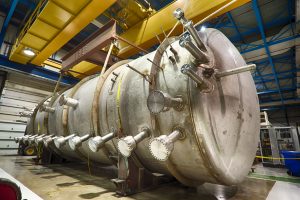PhD project: Neutrino physics with LArTPC experiments (MicroBooNE, SBND and DUNE)
Project description
 MicroBooNE and SBND are Liquid-Argon Time Projection Chamber (LArTPC) experiments running at Fermilab near Chicago. MicroBooNE has taken five years of data and SBND is nearing construction. Their primary physics goal, as a part of the Short Baseline Neutrino (SBN) programme, is to search for short-baseline oscillations hinting at the existence of a new particle - the sterile neutrino. The use of liquid argon allows us to measure the products of neutrino interactions with high precision and these experiments are paving the way for the understanding of how neutrinos interact with heavier nuclei.
MicroBooNE and SBND are Liquid-Argon Time Projection Chamber (LArTPC) experiments running at Fermilab near Chicago. MicroBooNE has taken five years of data and SBND is nearing construction. Their primary physics goal, as a part of the Short Baseline Neutrino (SBN) programme, is to search for short-baseline oscillations hinting at the existence of a new particle - the sterile neutrino. The use of liquid argon allows us to measure the products of neutrino interactions with high precision and these experiments are paving the way for the understanding of how neutrinos interact with heavier nuclei.
DUNE is a next-generation neutrino experiment planned to start running in the second half of the next decade. A beam of neutrinos will be sent 800 miles from Fermilab to the Sanford Underground Research Facility in South Dakota. The far detector consists of a TPC using 70,000 tones of liquid argon. The primary physics goal of the experiment is to understand if the matter-antimatter asymmetry of the universe is due to CP violation in the neutrino sector. The detector is also able to search for proton decay and astrophysical neutrinos (e.g. from supernovae).
Projects in this area will be focussed on the activities of the Edinburgh group. These are are related to (electron-)neutrino cross sections, beyond the standard  model (BSM) searches, detector simulation and photodetector development, as well as data acquisition and large-scale computing. There is the opportunity to become involved detector construction (SBND), dedicated measurements with electron beams (e4nu) and in testbeam activities such as proto-DUNE.
model (BSM) searches, detector simulation and photodetector development, as well as data acquisition and large-scale computing. There is the opportunity to become involved detector construction (SBND), dedicated measurements with electron beams (e4nu) and in testbeam activities such as proto-DUNE.
Project supervisors
- Prof Andrzej Szelc (School of Physics & Astronomy, University of Edinburgh)
- Dr Cheryl Patrick (School of Physics & Astronomy, University of Edinburgh)
- Professor Franz Muheim (School of Physics & Astronomy, University of Edinburgh)
The project supervisors welcome informal enquiries about this project.
Find out more about this research area
The links below summarise our research in the area(s) relevant to this project:
- Find out more about Neutrinos.
- Find out more about Particle Physics Experiment.
- Find out more about the Institute for Particle and Nuclear Physics.
What next?
- Find out how to apply for our PhD degrees.
- Find out about fees and funding and studentship opportunities.
- View and complete the application form (on the main University website).
- Find out how to contact us for more information.

